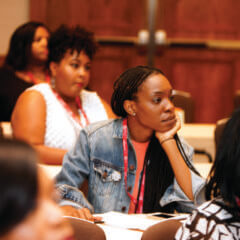
Small Business Matters during the National Urban League Conference, St. Louis, July 29, 2017. Photo: Brian Branch Price
As he posed for photos, Jimmy Prude wore a smile that was nearly as big as his oversized check. Moments earlier, Prude, the founder and CEO of Chicago-based Jimmy’s Vegan, had won a pitch contest at the 2017 Small Business Matters Entrepreneurship Summit, a one-day event for minority business owners at the National Urban League (NUL) Conference in St. Louis on July 26–29. Nine finalists presented their ideas to a panel of judges, with Prude earning first prize: $5,000, provided by the Coca-Cola Company.
“This was a huge win for us,” said Prude, a business graduate from Howard University whose career includes stints as a tech worker at Microsoft, a technology instructor for a charter school, and a community organizer in Chicago’s South Side. Prude’s company sells Jimmy’s Vegan Cookies in stores throughout Chicago, including various Whole Foods locations, and he plans to invest the $5,000 prize in market research and manufacturing.
‘CONNECTIONS CREATE OPPORTUNITY’
For the Small Business Matters Entrepreneurship Summit, events like the pitch contest add zest to the usual conference fare. In addition to participating in workshops on money, management, and marketing, attendees could pitch their ideas to a casting team from “Shark Tank,” ABC’s business-based reality series. Nearly half of the roughly 300 attendees participated, and 22 proceeded to the next round of auditions.

At the Small Business Matters Entrepreneur- ship Summit, emphasis is on empowering minority small-business owners — including with a ‘Shark Tank’ pitch contest. Photo: Brian Branch Price
The casting sessions were part of an initiative led by Brandon Andrews, senior consultant for Values Partnerships, a Washington, D.C., firm that connects clients — including Amazon, Google, and Amnesty International — with minority communities. Andrews is leading a nationwide casting tour to bring more diverse ideas and voices to “Shark Tank,” and NUL’s summit — now in its seventh year — seemed like a natural fit. Since 1910, NUL has worked to improve the standard of living in underserved urban communities and to create economic empowerment. In 2006, the organization launched the first of 13 nationwide Entrepreneurship Centers, which provide minority entrepreneurs with counseling, mentoring, and training.
The summit may sound fun, but the stakes are high for minority-owned small businesses, which face a variety of obstacles to success. The most significant challenge? Access to capital, according to Marc Morial, NUL’s president and CEO. That’s why the summit’s presenters include not only corporate executives and political leaders, but bankers and other experts who discuss topics such as preparing business loans.
Another challenge is access to connections, said Morial, so the summit provides a networking breakfast and an Empowerment Room with resources from the private and public sector. “Connections create opportunity,” Morial said. “People do business with people they know and people they trust. For African-Americans, the longstanding racial discrimination in the country is sometimes a barrier to that.”
A DIFFERENT KIND OF CONFERENCE
Much like the summit, the NUL Conference mixes serious issues with entertaining programs. The goal: to create a dialogue on weighty subjects such as social and economic inequality, health care, jobs, and education in disadvantaged communities. But this year’s conference at the America’s Center in St. Louis also included parties, a power walk with Morial through the city, and a Zumba session with celebrity fitness trainer Shaun T.
[pullquote]We advocate for social and economic justice.[/pullquote]
The roughly 20,000 attendees are a mix of 5,000 visitors from across the country and 15,000 people from the local community. “We want them to see the Urban League in action,” Morial said. “We help people find jobs. We help people prepare their children for success in school. We connect people to major corporations for opportunities and jobs and careers. We advocate for social and economic justice.”

Small Business Matters during the National Urban League Conference, St. Louis, July 29, 2017. Photo: Brian Branch Price
The host community certainly benefits from the conference. On the final day in St. Louis, NUL gave school supplies and 10,000 backpacks to local children as part of a free community festival. Thousands of job seekers participated in a career and networking fair, which offered attendees free LinkedIn headshots, conversations with career coaches, and resume critiques. Attendees could also meet with a recruiter; according to Morial, 20 to 30 people received job offers on the spot.
As for the summit, even if attendees don’t appear on “Shark Tank,” they’re still winners. “A lot of people tell us, ‘I met someone there and we’re doing business together,’” Morial said. “Or ‘I met a banker and I’m talking to them about financing.’ What we’ve learned is that when you put a group of small-business owners in a room, good things can happen.”

